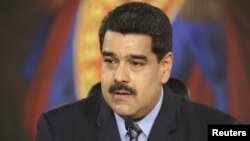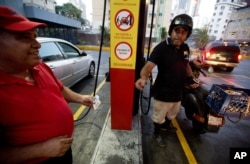Venezuela's President Nicolas Maduro has announced long-awaited economic reforms, but analysts say they'll barely have any effect in rescuing the economy.
The socialist president raised gasoline prices and devalued one of the oil country's multiple exchange rates Wednesday. He assured supporters the steps don't amount to a dramatic austerity scheme.
Analysts agree. They say the modest adjustments have no hope of bringing in the money Venezuela needs to save its crashing economy.
"Whatever Maduro does now, it's going to be too little, too late,'' said Bruce Magid, dean of the international business school at Brandeis University, who previously worked as a banker in Caracas.
Even a recovery in the price of oil would probably not be enough to save the economy at this point, he said.
"It buys him more time. But it doesn't do anything to address the underlying structural problems, which is the country has stopped producing and exporting anything,'' he said.
Underlining the gravity of the situation, the Central Bank said Thursday said inflation hit 181 percent last year, and the economy shrank by nearly 6 percent. The International Monetary Fund predicts inflation will top 700 percent by the end of the year.
Venezuela has been spending more than $12 billion a year to subsidize gasoline. The hike could save the state oil company the equivalent of more than 1 percent of the country's gross domestic product this year, according to the Caracas-based consultancy Ecoanalítica.
But analysts say a much steeper hike is needed to chip away at the country's budget deficit of around 25 percent of gross domestic product. The new scheme means drivers will pay dimes instead of pennies to fill a gas tank, and the fixed price will continue to be eroded by raging inflation.
Maduro also changed the strongest of Venezuela's exchange rates, lowering it from 6.3 bolivars per dollar to 10. That rate is supposed to be available only for vital imports like food and medicine.
The weakest of the official rates, which trades at 200 bolivars to the dollar, is still just a fifth of the black market rate, leaving the door open to arbitrage and corruption.
The newly ascendant opposition says the problem is that the government itself cannot stop stealing.
Opposition leader Jesus Torrealba said the measures would do nothing to stop the opportunities for rampant theft created by Venezuela's byzantine currency scheme.
"This crisis is the result of years and years of looting the public coffers,'' he told reporters. "These new measures do nothing to rectify the obscene chasm between exchange rates.''
Gas price increased conjure the specter of violence in Venezuela because of a days-long Caracas riot in 1989 that followed the announcement of austerity measures including a gas hike.
On Thursday, however, motorists were calmly waiting to buy what continues to be the world's cheapest gas.
"These announcements did nothing to alleviate my sense of desperation and sadness,'' 50-year-old María Quintero said. "We don't care if we have to pay 10 bolivars for gas; it's the always waiting in lines and getting up at 4 in the morning to buy a little bit of rice.''
The Maduro administration says it is looking for ways to work out distortions at home while aggressively pushing other oil countries to drive up oil prices. On Wednesday, Maduro said the country had made progress toward reaching an agreement with key allies to freeze production.
But with $10 billion in bond payments coming due this year, analysts say there are few paths for Venezuela to avoid default.
"Maduro did not explain how the state is going to pay its debt, pay for primary materials, and guarantee food for the people,'' said Luis Vicente León, president of the local polling firm Datanalisis. "It's just impossible that these measures will be able to resolve a problem of this scale.''






